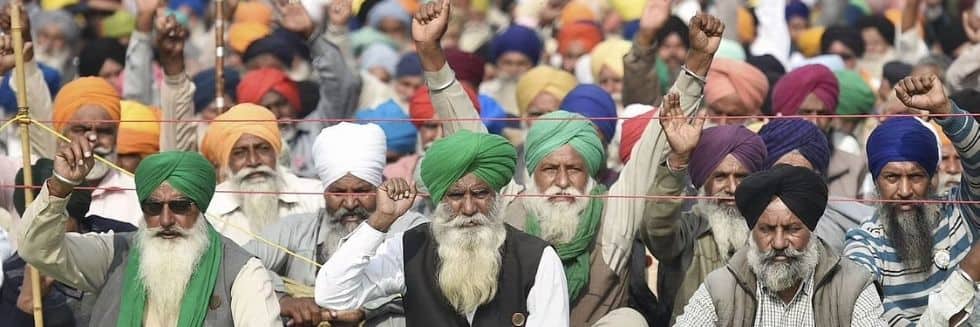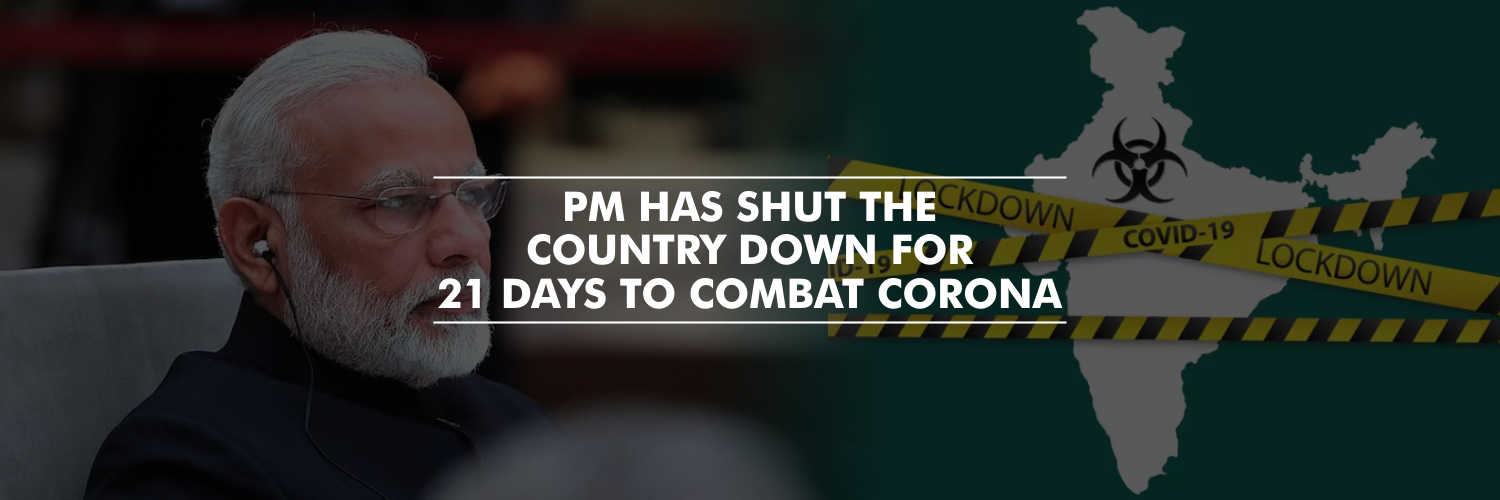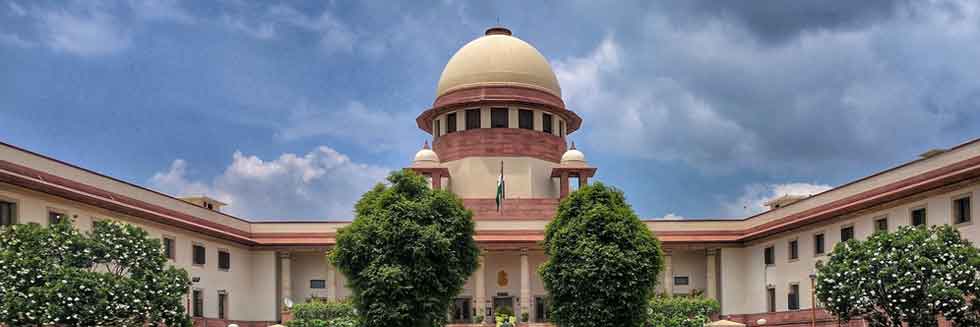The Farmer’s Union Leaders have announced a Bharat Bandh on December 8 in support of the ongoing protest against the New Farm Laws. The decision came after several rounds of talks between the Farmers and the Central Government regarding the new farm laws have remained inconclusive. Reportedly, on 8th December, farmers will block all roads leading to Delhi and occupy the toll plazas too, in order to make an impact.
As per sources, the farmers’ protests on the borders of the National Capital are going to further intensify, as several non-BJP political parties have on 6th December extended their support for “Bharat Bandh” on December 8.
Congress Spokesperson Pawan Khera has stated that Congress will be demonstrating their protests in line with Indian farmers outside their party offices. “It will be a step strengthening Rahul Gandhi’s support to the farmers. We will ensure that the demonstration is successful,” stated Khera.
Further, on Saturday, the Communist Party of India (CPI), Communist Party of India (Marxist) [CPI(M)] and CPM(M-L), All India Forward Bloc, and Revolutionary Socialist Party released a joint statement saying that they too are extending their solidarity with farmers and will protest against the new farm laws.
On the other hand, Telangana Chief Minister, as well as TRS chief K Chandrashekhar Rao, are also going to support Bharat Bandh on December 8 and will participate in it actively. Many states including Maharashtra, Tamil Nadu, and West Bengal will also be demonstrating protests. While West Bengal’s ruling Trinamool Congress has been supporting farmers for a few days now, the party is not likely to be a part of Bharat Bandh.
Reason for the ongoing protests
The reason behind the widespread protests is the three new laws – The Farmers` Produce Trade and Commerce (Promotion and Facilitation) Act, 2020, The Farmers (Empowerment and Protection) Agreement on Price Assurance and Farm Services Act, 2020, and The Essential Commodities (Amendment) Act, 2020.
A set of three laws passed in September aims to deregulate India’s enormous agriculture sector. Prime Minister Narendra Modi has said that the new laws will “liberate” farmers from the tyranny of middlemen.
However, many farmers fear that they stand to lose more than what they could gain from the new regulations and that the main beneficiaries will be agricultural corporations with gargantuan financial firepower.
Changes brought by the New Farm Laws
As per the new farm laws, the government has opined to make it easier for farmers to bypass government-regulated markets (i.e., Mandis) and sell their produce directly to private buyers. The Farmers can now enter into contracts with private companies, a practice known in India as contract farming, and sell across state borders.
The new regulations also allow traders to stockpile food which is reportedly a shift away from prohibitions against hoarding, which could make it easier for traders to take advantage of rising prices, like during a pandemic. However, these practices were criminal offenses under the old rules.
Why are farmers protesting against the New Farm Laws?
Among the various reasons for the protest, one of the major reasons for the ongoing farmers’ protest is that the new rules remove many of their safeguards. As per reports, more than 86% of India’s cultivated farmland is controlled by smallholder farmers who own less than two hectares of land each. According to the British Broadcasting Corporation (BBC), Indian farmers are mostly small or marginal wherein 68% of them own less than one hectare of land. On the other hand, only 6% of them actually receive guaranteed price support for their crops, and more than 90% of the farmers sell their produce in the market.
“The government has left us at the mercy of big corporations. It is preposterous to believe that farmers who have small landholdings will have any bargaining power over private players,” Rashpinder Singh, a 27-year-old farmer from Punjab state stated to the sources.
Therefore, farmers fear that they just do not have enough bargaining power to get the kinds of prices they need for a decent standard of living when they negotiate to sell their produce to larger companies.
Major points of contentions in the New Farm Laws
The Farmers (Empowerment & Protection) Agreement of Price Assurance and Farm Services Act
- This Act draws a framework for contract farming agreement between farmers and buyers before sowing of a crop and for dispute settlement prescribes three-level mechanisms – the conciliation board, sub-divisional magistrate, and appellate authority. However, the points of contention are:
- Under this law, it’s not mandatory for a company to make a written contract with the farmer for any contract farming. So, even if the company violates the terms of the contract, the farmer cannot prove it.
- It does not have any provision to penalize companies that do not register their contracts. For instance: Last year, Potato farmers from Gujarat witnessed a big issue where Pepsico attempted to penalize potato farmers for growing the same seed varieties. The farmer organizations finally had to knock on the doors of the court and agitate to get justice.
- The Act does not prescribe or specify that the contract price of the crop should be at least equivalent or above the MSP. It means the contractor/companies can pay whatever price they want to the farmer. India’s experience of contract farming has been poor with farmers getting very low rates through contract farming as compared to selling it in government mandis on MSPs (Minimum Support Price)
The Essential Commodities Act (Amendment) Act:
- It empowers the Central government to regulate food items in extraordinary circumstances or impose stock limits if there is a steep price rise. However, the points of contention are:
- Till now only farmers, farmer cooperatives, and Farmer Producer Organisations didn’t have any limit or restriction for stocking, producing, or selling their crop. As a result, they make the conscious decision of selling their crops only when the market or the buyer is offering a good price for the crop. So, under this Act, the farmers are not getting any new freedom. On the contrary, the government is now removing all the foodstuffs from this category allowing companies and traders to store as much quantity of the food as they want which amounts to promoting hoarding.
- Through this Amendment, the government is giving up its power to prevent hoarding and controlling price inflation. According to the law, the government can intervene only if there is a 50% price rise over the previous year’s price in the case of non-perishable goods and a 100% price rise over the previous year’s perishable goods.
Farmers’ Produce Trade and Commerce (Promotion and Facilitation) Act:
- This allows intra-state and inter-state trade of farmers’ produce beyond the physical premises of Agricultural Produce and Livestock Market Committee (APMC) markets. The state will be now prohibited from levying any market fees or cess outside APMC areas.
- The government says that now the farmers will have the freedom to sell to anyone. Under the Act, the agri-business companies, corporate and traders will be allowed to open their own markets to purchase from farmers. However, the biggest fear coming from this is that it will destroy the level playing field between the APMC markets and other traders. Under the Act, the trade outside the APMC Mandis is virtually unregulated.
- Currently, if the farmers feel that the traders/corporate/agents working inside the APMC Mandis are involved in any unfair practices, they could complain to the APMC Officers located in the yard itself. However, with the new Act, in case of any disputes, farmers would be required to go to a sub-divisional magistrate court, which is beyond the capacity of small farmers to pursue, given their financial constraints.
The farmers have camped outside as many as five borders across Delhi for the past 10 days demanding the Bharatiya Janata Party (BJP)-led government at the Centre to repeal the three farm reforms. However, the Centre has urged farmers to end the stir citing COVID-19 and cold weather and called for the sixth round of talks with farmers’ representatives of over 40 unions on December 9.
PM Modi’s say on the New Farm Laws
Prime Minister Narendra Modi said that with the help of the new farm laws, the farmers are being empowered by giving them options for a bigger market and reforms are being done in the interest of farmers, which will give them more options. He stated that India’s agricultural products are famous all over the world while asking, “Shouldn’t a farmer get the freedom to sell his produce directly to those who give them better prices and facilities.”
Earlier, PM Modi stated that the MSP was declared, but a very meager MSP purchase used to take place. “This deception went on for years. Large loan waiver packages were announced in the name of farmers, but they did not reach the small and marginal farmers. He added that big schemes were announced in the name of farmers but earlier regimes themselves believed that out of 1 rupee, only 15 paise reached the farmer, which is deceit in the name of schemes.
“Earlier, transactions outside the market were illegal. Now the small farmer can also take legal action on every deal that is out of the market. The farmer has now got new options and legal protection from fraud,” said PM Modi while quoting the concern of farmers with regards to disputes.
“I am confident, farmers who have some doubts on agricultural reforms today, will also take advantage of these agricultural reforms in the future and increase their income,” asserted PM Modi.
Meanwhile, farmer leaders maintain that they will settle for nothing less than a complete withdrawal of the new farm laws.
What shall be affected during the Bharat Band on December 8
- Bank services are likely to be affected due to the Bharat Band after various bank unions have offered their support to the farmers. In a statement, the All-India Bank Employees’ Association (AIBEA) said that the government should come forward and resolve their demands in the interest of the nation and farmers. Officer unions All India Bank Officers’ Confederation (AIBOC), All India Bank Officers’ Association (AIBOA), and Indian National Bank Officers’ Congress (INBOC) have requested the government to initiate meaningful dialogue to resolve the impasse by referring the bills to a select committee by a special Presidential Order.
- All modes of transportation are likely to take a hit, including all road services, especially those along the borders of the National Capital.
- Hotels and resorts across Punjab – Barring pre-existing marriage and banquet bookings already confirmed, all hotels, restaurants, resorts, and bars to remain closed to show support to Bharat bandh on December 8, sources quoted Hotel and Restaurant Association of Punjab saying.
- Further, farmer leaders have said that the milk and vegetable supply will be affected on December 8 and asked people to buy the essentials a day before.
- Parallel protests will be witnessed in parts of West Bengal, Tamil Nadu among others, Maharashtra. Farm unions have also appealed to farmers from Uttar Pradesh and Haryana borders to join them.






